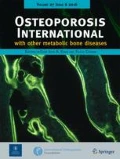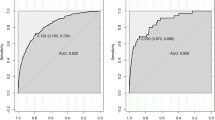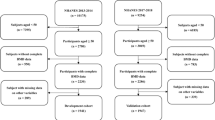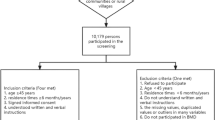Abstract
Identification of women at risk for osteoporosis is of great importance for the prevention of osteoporotic fractures. Routine BMD measurement of all women is not feasible for most populations, hence identification of a high-risk subset of women is an important element of effective preventive strategies. Methods: We identified 959 postmenopausal non-Hispanic women aged 51 years and above from the NHANES III study to assess the relative contribution of risk predictors for low BMD at the whole proximal femur and the femoral neck regions. Based on recognized risk factors for osteoporosis identified by a systematic literature search, we ran several multiple linear regression models based on the results of preceding bivariate analyses. We show several models based on their explanatory ability assessed by adjusted r 2, ROC, and C-value analyses rather than on the coefficients and P values. We furthermore examined the sensitivity, specificity, and predictive values of our preferred models for various cutoff T-scores—the choice of which will vary depending on different study goals and population characteristics. Results: Age and weight were by far the most informative predictors for low bone mineral density out of a list of 20 candidate risk predictors. Our preferred prediction models for the two regions hence contained only two variables: i.e., age and measured weight. The resulting parsimonious model to predict BMD at whole proximal femur had an adjusted r 2 of 0.43, an area under the ROC curve of 0.85, and a C-value of 0.70. Similarly, prediction for BMD at the femoral neck had adjusted r 2, area under the curve, and C-value of 0.39, 0.83, and 0.66, respectively. Conclusions: The model equations, predicted T-score = −1.332−0.0404 × (age) + 0.0386 × (measured weight) and predicted T-score = −1.318−0.0360 × (age) + 0.0314 × (measured weight) for whole proximal femur and femoral neck, respectively, can be used in field conditions for screening purposes. More complex prediction equations add little explanatory power. Based on the study goals and the population characteristics, specific cutoff T-scores have to be decided before using these equations.


Similar content being viewed by others
References
Blake GM, Fogelman I (1998) Applications of bone densitometry for osteoporosis. Endocrin Metab Clin 27:267–288
Blanchet C, Dodin S, Dumont Y, Turcot-Lemay L, Beauchamp J, Prud'homme D (1998) Bone mineral density in French Canadian Women. Osteoporos Int 8:268–273
Burger H, van Daele PL, Algra D, van den Ouweland FA, Grobbee DE, Hofman A, van Kuijk C, Schütte HE, Birkenhäger JC, Pols HA (1994) The association between age and bone mineral density in men and women aged 55 years and over: the Rotterdam study. J Bone Miner Res 25:1–13
Burt VL, Harris T (1994) The third national health and nutrition examination survey: contributing data on aging and health. Gerontologist 34:486–490
Caderette S, Jaglal SB, Kreiger N, McIsaac WJ, Darlington GA, Tu JV (2000) Development and validation of the Osteoporosis Risk Assessment Instrument to facilitate selection of women for bone densitometry. CMAJ 162:1289–1294
Dargent-Molina P, Poitiers F, Breart G (2000) In elderly women weight is the best predictor of a very low bone mineral density: evidence from the EPIDOS study. Osteoporos Int 11:881–888
Erdtsieck R, Pols H, Algra D, Kooy P, Birkenhäger J (1994) Bone mineral density in healthy dutch women: spine and hip measuremants ustin dual-energy X-Ray absoptiometry. Neth J Med 45:198–205
Fatayerji D, Cooper A, Eastell R (1999) Total body and regional bone mineral density in men: effect of age. Osteoporos Int 10:59–65
Glynn W, Meilahn N, Charron M, Anderson S, Kuller L, Cauley J (1995) Determinants of bone mineral density in older men. J Bone Miner Res 10:1769–1777
Hanley JA, McNeil BJ (1982) The meaning and use of the area under a receiver operating characteristic (ROC) curve. Radiology 143:29–36
Hanley JA, McNeil BJ (1983) A method of comparing the area under receiver operating characteristic curves derived from the same cases. Radiology 148:839–843
Hansen M, Overgaard K, Al E (1994) Assessment of age and risk factors on bone density and bone turnover in healthy premenopausal women. Osteoporos Int 4:123–128
Hiley D, Sampietro-Colom L, Marshall Deborah, Rico R, Greandos A, Asua J (1998) The effectiveness of bone density measurement and associated treatments for prevention of fracture. Int J Technol Assess Health Care 14(2):237–254
Jerges M, Glüer C (1997) Assessment of fracture risk by bone density measurement. Semin Nucl Med 27:261–275
Kanis J, Melton LF, Christiansen C (1994) The diagnosis of osteoporosis. J Bone Miner Res 9:1137–1141
Koh LKH, Ben Sedrine WB, Torralba TP, Kung A, Fujiwara S, Chan SP, Huang QR, Rajatanavin R, Tsai KS, Park HM, Reginster JY (2001) A simple tool to identify Asian women at increased risk of osteoporosis. Osteoporos Int 12:699–705
Kröger H, Tuppurainen M, Honkanen R, Alhave E, Saarikoski S (1994) Bone mineral density and risk factors for osteoporosis: a population-based study of 1600 perimenopausal women. Calcif Tissue Int 55:1–7
Larcos G, Baillon L (1998) An evaluation of bone mineral density in Australian women of Asian descent. Australas Radiol 42:341–343
Looker A, Johnston CJ, Wahner H, Dunn W, Calvo M, Harris T, Heyse S, Lindsay R (1995) Prevalence of low femoral bone density in older U.S. women from NHANES III. J Bone Miner Res 10:796–802
Looker AC, Orwoll ES, Johnston CC Jr, Lindsay RL, Wahner HW, Dunn WL, Calvo MS, Harris TB, Heyse SP (1997) Prevalence of low femoral bone density in older U.S. adults from NHANES III. J Bone Miner Res 12(11):1761–1768
Lühmann D, Kohlmann T, Lange S, Raspe H (1998) Die Rolle der Osteodensitometrie im Rahmen der Primär-, Sekundär- und Tertiärprävention / Therapie der Osteoporose. HTA-Bericht DIMDI13. Deutsches Institut für Medizinische Dokumentation und Information, Bonn
Lydick E, Cook K, Turpin J, Melton M, Stine R, Byrnes C (1998) Development and validation of a simple questionnaire to facilitate identification of women likely to have low bone density. Am J Manag Care 4:37–48
Marcus R, Greendale G, Blunt B, Bush T, Sherman S, Sherwin R, Whner H, Wells B (1994) Correlates of bone mineral density in the Postmenopausal Estrogen/Progestin Interventions Trial. J Bone Miner Res 9:1467–1476
Marshall D, Johnell O, Wedel H (1996) Meta-analysis of how well measures of bone mineral density predict occurrence of osteoporotic fractures. Br J Med 312:1254–1259
Michaelsson K, Bergstrom R, Mallmin H, Holmberg L, Wolk A, Ljunghall S (1996) Screening for osteopenia and osteoporosis: selection by body composition. Osteoporos Int 6:120–126
Murphy S, Khaw K-T, May H, Compston J (1994) Parity and bone mineral density in middle-aged women. Osteoporos Int 4:162–166
Ray NF, Chan JK, Thamer M, Melton LJ 3rd (1997) Medical expenditures for the treatment of osteoporotic fractures in the United States in 1995: report from the National Osteoporosis Foundation. J Bone Miner Res 12:24–35
Ribbot C. Pouilles JM, Bonneu M, Tremollieres F (1992) Assessment of the risk of post-menopausal osteoporosis using clinical factors. Clin Endocrinol 36:225–228
Steiger P, Cummings S, Black D, Spencer N, Genant H (1992) Age-related decrements in bone mineral density in women over 65 J Bone Miner Res 7:625–632
Tosteson AN, Rosenthal DI, Melton LJ 3rd, Weinstein MC (1990) Cost effectiveness of screening perimenopausal white women for osteoporosis: one densitometry and hormone replacement therapy. Ann Intern Med 113:594–603
Tsai K-S, Huang K-M, Chieng P-U, Su C-T (1991) Bone mineral density of normal Chinese women in Taiwan. Calcif Tissue Int 48:161–166
Tuppurainen M, Kröger H, Al E (1995) The effect of gynecological risk factors on lumbar and femoral bone mineral density in peri- and postmenopausal women. Maturitas 21:137–145
Van der Voort DJM, Brandon S, Dinant GJ, van Wersch JWJ (2000) Screeing for osteoporosis using easily obtainable biometrical data: diagnostic accuracy of measured, self-reported and related BMI, and related costs of bone mineral density measurements. Osteoporos Int 11:233–239
Wahner HW, Looker A, Dunn WL, Walters LC, Hauser MF, Novak C (1994) Quality control of bone densitometry in a national health survey (NHANES III) using three mobile examination centers. J Bone Mineral Res 9:951–960
Weinstein L, Ullery B, Bourguignon C (1999) A simple system to determine who needs osteoporosis screening. Obstet Gynecol 93:757–760
Whittington R, Faulds D (1994) Hormone replacement therapy: II. a pharmacoeconomic appraisal of its role in the prevention of postmenopausal osteoporosis and ischaemic heart disease. Pharmacoeconomics. 5(6):513–554
WHO (1994) Assessment of fracture risk and its application to screening for postmenopausal osteoporosis. Report of a WHO Study Group. WHO Technical Report Series, No. 843. World Health Organization, Geneva
Author information
Authors and Affiliations
Corresponding author
Rights and permissions
About this article
Cite this article
Wildner, M., Peters, A., Raghuvanshi, V.S. et al. Superiority of age and weight as variables in predicting osteoporosis in postmenopausal white women. Osteoporos Int 14, 950–956 (2003). https://doi.org/10.1007/s00198-003-1487-z
Received:
Accepted:
Published:
Issue Date:
DOI: https://doi.org/10.1007/s00198-003-1487-z




